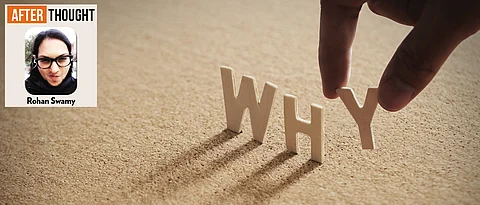

So what does it mean?’ I asked.
‘It means, ‘Everything happens for a reason’,’ she said carefully in her heavy South-East European English. A and I were sitting at Govinda’s, a moderately expensive restaurant run by the ISKCON foundation at the busy LUAS tram line intersection on O’Connell Street, after a long day of apartment hunting, when the conversation had come up. Back then, we went there every evening to get our daily dose of nutrition, in the form of freshly-cooked vegetarian meals available for one euro.
We both arrived in Dublin almost at the same time in the summer of 2015. We first met at the Abbey Court backpackers hostel and bonded over a cigarette lighter, of all things. Living on sparse funds, our routine those days consisted of waking up early to avail free breakfast at the hostel and then scouting the suburbs for a place to live. We would usually skip lunch, and instead have warm coffee smuggled in vacuum flasks from the breakfast tables. In the evenings, we would troop down to Govinda’s, and wait till the clock struck 8.30 pm. The restaurant would slash the prices of the food down to one euro. So we would sit with our plates filled with hot, vegetarian fare and eat away to our heart’s content, feeling like escapist millionaires who had for that brief moment conquered the world. On that particular day, conversations had meandered from the politics of Asia and Europe, to the craft of writing, to finding a house in Dublin and finally to our own personal back stories, where this line had come up.
‘I love that line’, she said, in between mouthfuls of Tofu curry mixed with steamed rice. ‘Todo Pasa Por Algo is an important part of life.’
The phrase sounded more like a novelty item and I didn’t think of looking into the deeper layers it brought along.
But then time unravels layers, just as it does the intentions of the world and of the people in it. My need for relocation was born out of a need to escape what I call ‘my personal hell’. I often described my exit from Pune and from India as one that happened in the quiet of the night, unknown to most. Not that I didn’t want to celebrate going to write at Oscar Wilde’s house itself, but coming at the back of personal and professional tragedies, my ability to do so had diminished significantly.
Rarely have escapes been as easy or colourful as we would like them to be. There was a bitter aftertaste which had followed me to Dublin. It stayed on till I was finally able to decipher the importance of the line that A had introduced me to, that evening. Now, three Diwalis later, I understand the meaning behind that phrase in parts, if not whole. If I hadn’t gone through things back then, I wouldn’t be here now. And if I am not going through the things that are happening now, I will not be able to reach the next stop that I wish to, in life.
The law of reasons, as A had told me, doesn’t always let us understand things as they happen, but they do so in hindsight. A change that alters your very ideals and core beliefs is not often a happy one. It might leave you gasping for breath in an open field, take the sleep away from your eyes for months on end, leave you questioning everything, including yourself, and perhaps take away your ability to look at your world with innocence. And more often than not, these changes hit you in the face like an express train and your crash is swift, precipitous and measurable on a Richter scale.
But after a crash also comes rebuilding. And that brings along with it a clarity of vision, the lightness of freedom and a sense of freshness about yourself. It allows you to find room in the corner of your own hearts to dance again, to feel grateful for your existence and find compassion for others. Lastly, it makes you set the bar of character very high — for yourself as well as for the people you surround yourself with. And when the fog clears up, you find the justifications of the personal hell, the law of reasons brings less war and more peace, with them.
A couple of days back A and I, were speaking of our initial days of struggle in Dublin and how well we both turned out eventually. And while we collectively agreed that we are both still ‘works in progress’, we were also convinced that a sense of positivity and the spirit of rebuilding and not settling for mediocrity, persists within us. We spoke fondly of the old days and laughed, as we confided nervous fears of an ever uncertain future.
‘You remember, Todo Pasa Por Algo?’ she asked.
‘Of course I do. It helped bring me back to myself’, I said and smiled.
(Names have been withheld to respect privacy.)
(Rohan Swamy is a former journalist, writer, photographer, now working at Trinity College Dublin)
